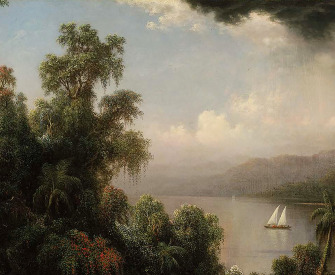Our trim ship was speeding toward
the Sirens’ island, driven on by the brisk wind.
But then—the wind fell in an instant,
all glazed to a dead calm,
a mysterious power hushed the heaving swells.
The oarsmen leapt to their feet, struck the sail,
stowed it deep in the hold and sat to the oarlocks,
thrashing with polished oars, frothing the water white.
Now with a sharp sword I sliced an ample wheel of beeswax
down into pieces, kneaded them in my two strong hands
and the wax soon grew soft, worked by my strength
and Helios’ burning rays, the sun at high noon,
and I stopped the ears of my comrades one by one.
They bound me hand and foot in the tight ship—
erect at the mast block, lashed by ropes to the mast—
and rowed and churned the whitecaps stroke on stroke.
We were just offshore as far as a man’s shout can carry,
scudding close, when the Sirens sensed at once a ship
was racing past and burst into their high, thrilling song!
“Come closer, famous Odysseus—Achaea’s pride and glory—
moor your ship on our coast so you can hear our song!
Never has any sailor passed our shores in his black craft
until he has heard the honeyed voices pouring from our lips,
and once he hears to his heart’s content sails on, a wiser man.
We know all the pains that the Greeks and Trojans once endured
on the spreading plain of Troy when the gods willed it so—
all that comes to pass on the fertile earth, we know it all!”
So they sent their ravishing voices out across the air
and the heart inside me throbbed to listen longer.
I signaled the crew with frowns to set me free—
they flung themselves at the oars and rowed on harder,
Perimedes and Eurylochus springing up at once
to bind me faster with rope on chafing rope.
But once we’d left the Sirens fading in our wake,
once we could hear their song no more, their urgent call—
my steadfast crew was quick to remove the wax I’d used
to seal their ears and loosed the bonds that lashed me.
We’d scarcely put that island astern when suddenly
I saw smoke and heavy breakers, heard their booming thunder.
The men were terrified—oar blades flew from their grip,
clattering down to splash in the vessel’s wash.
She lay there, dead in the water,
no hands to tug the blades that drove her on.
But I strode down the decks to rouse my crewmen,
halting beside each one with a bracing, winning word:
“Friends, we’re hardly strangers at meeting danger—
and this danger is no worse than what we faced
when Cyclops penned us up in his vaulted cave
with crushing force! But even from there my courage,
my presence of mind and tactics saved us all,
and we will live to remember this someday,
I have no doubt. Up now, follow my orders,
all of us work as one! You men at the thwarts—
lay on with your oars and strike the heaving swells,
trusting that Zeus will pull us through these straits alive.
You, helmsman, here’s your order—burn it in your mind—
the steering oar of our rolling ship is in your hands.
Keep her clear of that smoke and surging breakers,
head for those crags or she’ll catch you off guard,
she’ll yaw over there—you’ll plunge us all in ruin!”
So I shouted. They snapped to each command.
No mention of Scylla—how to fight that nightmare?—|
for fear the men would panic, desert their oars
and huddle down and stow themselves away.
But now I donned my heroic armor, seized long spears
in both my hands and marched out on the half deck,
forward, hoping from there to catch the first glimpse
of Scylla, ghoul of the cliffs, swooping to kill my men.
But nowhere could I make her out—and my eyes ached,
scanning that mist-bound rock face top to bottom.
Now wailing in fear, we rowed on up those straits,
Scylla to starboard, dreaded Charybdis off to port,
her horrible whirlpool gulping the sea surge down, down
but when she spewed it up—like a cauldron over a raging fire—
all her churning depths would seethe and heave—exploding spray
showering down to splatter the peaks of both crags at once!
But when she swallowed the sea surge down her gaping maw
the whole abyss lay bare and the rocks around her roared,
terrible, deafening—
bedrock showed down deep, boiling
black with sand—
and ashen terror gripped the men.
But now, fearing death, all eyes fixed on Charybdis—
now Scylla snatched six men from our hollow ship,
the toughest, strongest hands I had, and glancing
backward over the decks, searching for my crew
I could see their hands and feet already hoisted,
flailing, high, higher, over my head, look—
wailing down at me, comrades riven in agony,
shrieking out my name for one last time!
Just as an angler poised on a jutting rock
flings his treacherous bait in the offshore swell,
whips his long rod—hook sheathed in an ox-horn lure—
and whisks up little fish he flips on the beach break,
writhing, gasping out their lives…so now they writhed,
gasping as Scylla swung them up her cliff and there
at her cavern’s mouth she bolted them down raw—
screaming out, flinging their arms toward me,
lost in that mortal struggle…
Of all the pitiful things I’ve had to witness,
suffering, searching out the pathways of the sea,
this wrenched my heart the most.
From The Odyssey. The monsters Scylla and Charybdis are thought to represent a rock and a whirlpool in the Strait of Messina, which separates Sicily from mainland Italy. The Oxford English Dictionary states that Charybdis is “used allusively of anything likely to cause shipwreck of life, etc., and especially in combination with Scylla, of the danger of running into one evil or peril in seeking to avoid its opposite.” It is believed that considerable portions of the 15,693 lines in The Iliad and the 12,110 lines in The Odyssey were memorized by individual rhapsodes.
Back to Issue





